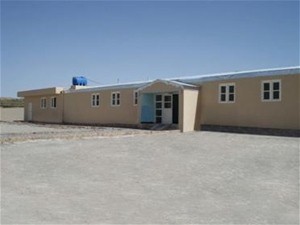
AFTER: Through USAID, the clinic received a major refurbishment and a newly constructed wing. The roof, building exterior, interior, and bathroom facilities were completely gutted and renovated. The clinic also received a new generator and water tank.
USAID/Afghanistan
Expanding basic health services for Afghans
1 SEPTEMBER 2006 | QALAT, ZABUL PROVINCE
Zabul Province is exceptionally poor, rural, and illiterate with a challenging topography of mountains to the north and remote villages speckled across a dry, arid landscape. Although there are clinics or hospitals in eight of the 11 districts, access to quality health services remains a great challenge for the majority of the province.
Zabul Province is exceptionally poor, rural, and illiterate with a challenging topography of mountains to the north and remote villages speckled across a dry, arid landscape. Although there are clinics or hospitals in eight of the 11 districts, access to quality health services remains a great challenge for the majority of the province.
Shinkay District is located just south of the provincial capital of Qalat with convenient road access to Zabul’s new provincial Hospital. The Shinkay clinic refurbishment has helped to greatly expand the functions and services of the health clinic. Increasing numbers of patients are coming from as far as the neighboring district of Nawbahar, where there is no health clinic. The clinic, which is managed by Ibn Sina, employs eleven professional staff and treats an average of 35 patients every day; critically ill and injured patients are transferred to the provincial hospital.
The $50,000 refurbishment was funded through USAID’s Quick Impact Program (QIP). This is a nation-wide program designed to provide USAID representatives located at the PRTs with the ability to implement small projects that further the core objectives of stability, reconstruction, and building support for the central government of Afghanistan.
The clinic construction was carried out by UNOPS through the work of a local firm, employing 35 people from the area. The clinic refurbishment is part of USAID’s larger effort to provide basic health services to rural communities, especially for women and children.







Comment
Make a general inquiry or suggest an improvement.